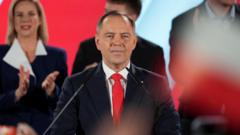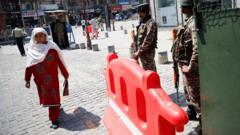As initial results emerge from the regional assembly elections in New Delhi, Prime Minister Narendra Modi’s Bharatiya Janata Party (BJP) seems to be on course to secure a decisive victory over the Aam Aadmi Party (AAP), which has held power in the capital for the last ten years. The BJP’s anticipated win marks a notable change in a region that has historically resisted Modi's Hindu-centric policies, even as his party solidifies its power nationwide.
BJP Takes Lead in Crucial New Delhi Election: A Political Shake-Up

BJP Takes Lead in Crucial New Delhi Election: A Political Shake-Up
Early election results indicate a significant shift in New Delhi's political landscape, as the Bharatiya Janata Party appears to reclaim control after three decades.
The unfolding political contest reflects the cutthroat dynamics of Indian politics, characterized by intense rivalry and aggressive campaigning. Parties have resorted to a mix of financial incentives, digital misinformation campaigns heavily reliant on AI, and even the incarceration of opposition figures to sway public opinion and secure votes. Amidst this electoral turmoil, the provision of essential government services for New Delhi's over 20 million residents continues to face significant challenges and disruptions.
As the situation develops, political analysts will be watching closely to see how these election results impact both regional governance and the broader political climate in India, signaling potential shifts in authority driven by voter sentiment and party strategy.
As the situation develops, political analysts will be watching closely to see how these election results impact both regional governance and the broader political climate in India, signaling potential shifts in authority driven by voter sentiment and party strategy.




















